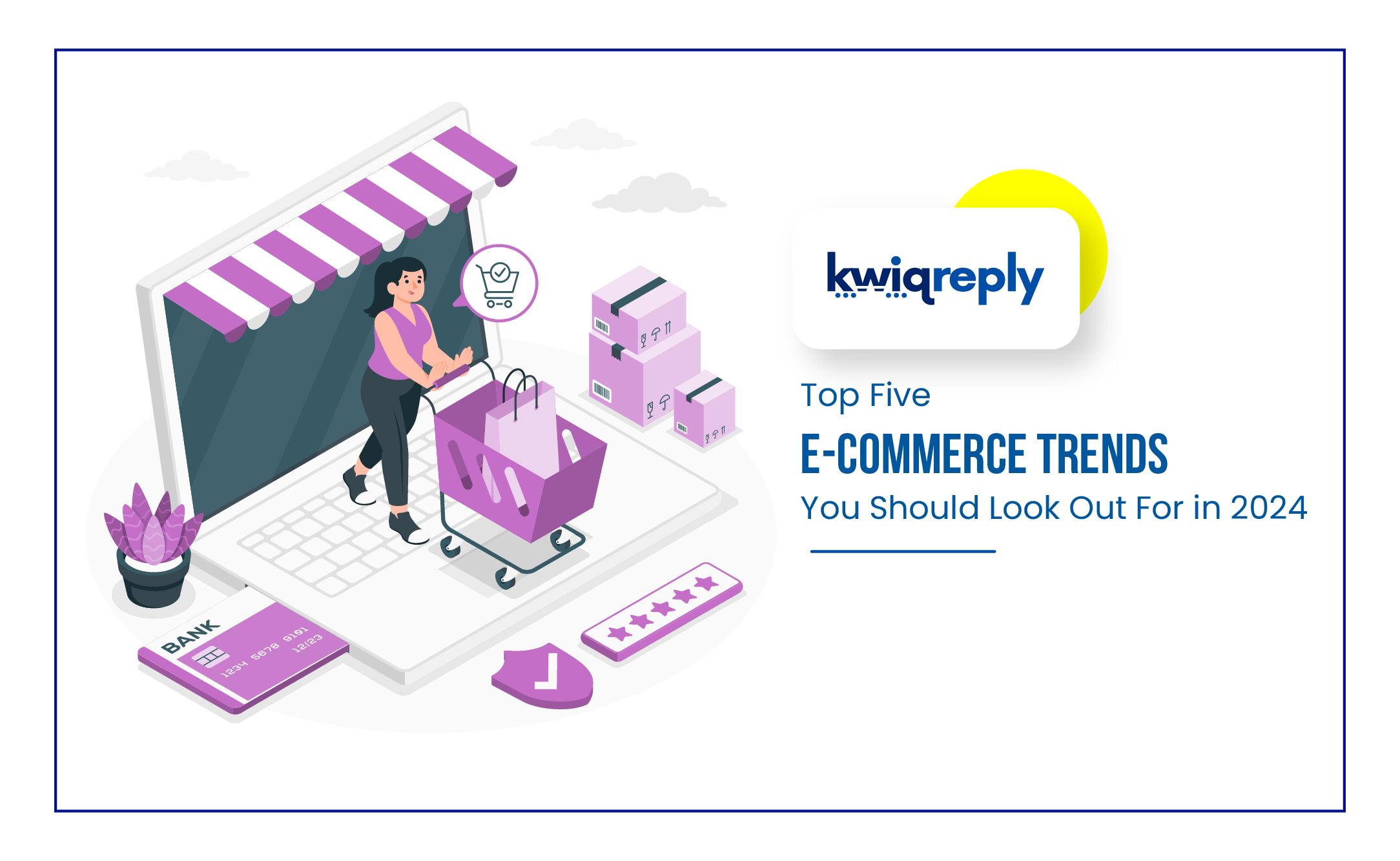
Top Five E-commerce Trends You Should Look Out For in 2024
E-commerce has been an ever-evolving industry, constantly adapting to the shifting tides of consumer behavior and technological advances. As we step into 2024, it's clear that the future of e-commerce is set to be exciting and innovative. In this blog, we will explore the top five e-commerce trends that you should keep a close eye on for 2024.
TL;DR
- Environmental responsibility is going to be at the forefront of business with an increased focus on sustainability and switching to environment-friendly options at every stage
- Augmented Reality is going to let e-commerce businesses revolutionize online shopping with live visualization for furniture and clothing. It will also let them provide additional information on products in a convenient manner
- Gamification will help e-commerce businesses increase engagement and improve the user experience by providing rewards and innovative means of interacting with the business
- Influencer marketing will be key for businesses looking to create hype or promote new launches, leveraging their pre-existing followers for the business
- Social media will continue to play a pivotal role in driving sales, raising brand awareness, and connecting with potential customers. In 2024, we will see more uses of social media such as for live shopping and social commerce with targetted promotional messaging
Sign up for the WhatsApp Business API and supercharge your business communication today!
Here are five of the top e-commerce trends to look out for in 2024:
-
Environmental Responsibility

Consumers are becoming increasingly aware of the environmental impact of their purchases. To this end, they're looking to support businesses committed to sustainability. This is a trend that has gained popularity with the general populace being more aware of their carbon footprints. In 2024, we can expect to see a continued focus on environmental responsibility in the e-commerce industry.
This could include trends such as:
-
Using sustainable packaging materials: Businesses can choose to use packaging materials that are made from recycled content, compostable, or biodegradable.
-
Offering alternative options: Customers can be given the option to offset the carbon emissions associated with their purchase.
-
Partnering with sustainable brands: Businesses can partner with brands that are committed to sustainability and ethical practices.
-
Being transparent about sustainability efforts: Businesses can be transparent with their customers about their sustainability efforts. This includes telling them about initiatives undertaken by them and how they are working to reduce their environmental impact.
-
-
Augmented Reality (AR)

AR is a technology that superimposes a computer-generated image on a user's view of the real world. With the advent of Meta, AR has come to the forefront. It has the potential to blend the real and virtual worlds to revolutionize online shopping. Games like Pokemon Go! and platforms like Snapchat have integrated AR into their applications. They let users use filters or view avatars and Pokemon in the real world through their camera lens.
In 2024, we can expect to see more e-commerce businesses using AR in their operations. Businesses will be able to provide a more immersive and engaging shopping experience for their customers. AR can visualize how a piece of furniture would look in their home before a purchase is made. Customers can also try on clothes or accessories virtually before they buy them.
AR could also be used to create more interactive and educational shopping experiences. For example, customers could use AR to scan a product barcode and learn more about its features and benefits.
-
Gamification

Gamification is the use of game-design elements and principles in non-game contexts. It can be used to make tasks more engaging and motivating for your customers.
In 2024, we expect to see more e-commerce businesses using gamification to improve the customer experience. Businesses can offer rewards for completing actions, such as signing up for the email list, writing reviews, or referring friends.
Businesses could also use gamification to create more interactive and engaging shopping experiences. For example, customers could participate in quizzes or challenges to earn discounts or rewards.
-
Influencer Marketing

Influencer marketing is a type of marketing that involves partnering with individuals who have a large following on social media. These individuals can help to promote your products or services to their followers.
Influencer marketing plays an important role in the e-commerce industry, especially for online retailers. Influencers can market products and services simply by using them and highlighting their benefits or uses. Businesses can also partner with influencers to promote their products or services, create sponsored content, or host live shopping events.
Businesses can also partner with diaspora influencers to promote their products and services to their communities. Diaspora trends are driven by immigrant communities, influenced by their culture, traditions, and values.
When choosing influencers to partner with, it's important to select individuals who have a following that is relevant to you. Therefore identifying your target audience is vital. It's also important to make sure that the influencer's values and brand align with your own.
-
Social Media

Social media is already a major player in the e-commerce industry, and its importance is only going to grow in 2024. Businesses can use social media to connect with their customers, promote their products and services, and drive sales.
Here are some tips for using social media to promote your e-commerce business:
-
Create high-quality content that is relevant to your target audience. This includes blog posts, articles, infographics, videos, and images.
-
Interact with your followers regularly. Respond to comments and questions, and participate in relevant conversations.
-
Run social media contests and giveaways. This is a great way to engage your followers and generate excitement about your brand.
Here are some of the top social media trends for e-commerce in 2024:
-
Live shopping: Live shopping is a type of e-commerce where businesses sell products directly to customers through social media, generally video streams. Live shopping is becoming increasingly popular in China and other parts of Asia, and it is expected to grow in popularity.
-
Social commerce: Social commerce is the integration of social media and e-commerce. It allows customers to shop for products directly on social media platforms. Examples of this include ads on Instagram and Facebook and selling directly through WhatsApp Catalogs. Social commerce is expected to grow in popularity in 2024, as more and more social media platforms add e-commerce features.
-
Use social media to create a sense of urgency and scarcity: This could involve running limited-time promotions or offering exclusive discounts to your social media followers.
-
Concluding,
The e-commerce industry is evolving at a rapid pace, and staying ahead of the curve is essential for businesses to remain competitive.
The e-commerce trends mentioned reflect changing consumer preferences and the adoption of innovative technologies, making e-commerce more engaging, and customer-oriented.
By understanding and incorporating these trends, e-commerce businesses can not only attract new customers but also retain them. As the digital landscape continues to evolve, the e-commerce industry is set to be more exciting and dynamic than ever in 2024.
At kwiqreply, we help you fully leverage the
features of the WhatsApp Business API for your organization. kwiqreply is a trusted WhatsApp
Business Solution Provider that has helped companies scale up their sales and customer
satisfaction. It brings you tried and tested features like bulk messaging, custom message
templates, quick response message buttons, etc. Combined with WhatsApp’s capability for
media-rich messages, you can send visually appealing messages and gather data for your surveys.
So, seize the opportunity, leverage WhatsApp's potential, and propel your business toward
sustainable growth and success! Know more about WhatsApp Business API’s features and start
sending surveys by checking out our website today!
Click here to book a free demo and let us show you how you can do more business with WhatsApp.
Read more blogs like this -